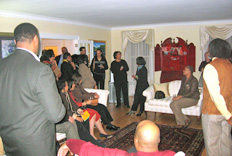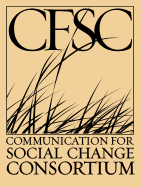|
|
|
 |
|
| The Consortium's "Conversation on Global Poverty," December 2005 |
|
|
| CFSC Consortium Body of Knowledge |
Are you looking for articles, books, essays, journals or reports on communication for development and social change? Is your interest HIV/AIDS, human rights or rural development? No matter what your issue, as long as it deals with communication for social change, you should be able to find useful references in the Body of Knowledge, the CFSC Consortium’s searchable database.
The body of knowledge has more than 3,000 references from around the world now registered. We invite you to consult the database for your use. And we encourage you to submit any reference you consider relevant to helping our database continue to grow. |
 |
| Inviting Artistic Images, Songs, Poetry Showing CFSC In Action |
Mazi invites your original images showing communication for social change in action. Whatever your medium"photography, painting, sketches, mosaics, murals, songs or dances"if you have an image showing people working together to give everyone a voice"we will consider publishing it in our online magazine. Unfortunately, we are unable to return your submission. We also reserve the right to crop and/or edit your work for style and content. Each creator will be credited online for his or her submission.
Please e-mail your contribution to mazi@communicationforsocialchange.org |
 |
| Inviting Guest Contributors |
Do you know of interesting examples of successful applications of communication for social change principles within your community or country?
Mazi is looking for good case stories of CFSC at work: illustrations of the process of dialogue leading to community decision-making, action, implementation, monitoring, assessment and evaluation. We’re especially interested in examples of how communication processes have been strengthened or established at a community level by people who have been traditionally marginalized.
Help all of us build a better understanding of the many and varied ways that public dialogue leads to community decision-making and action. Describe for us where it takes place and why. Explain how CFSC is working. Inspire us all by telling us your community’s story.
Please e-mail your contribution of at least 250 words to mazi@communicationforsocialchange.org
Please make sure your story includes the CFSC elements: catalyst or catalytic event, problem identification, dialogue, decision-making, community action, monitoring and evaluation, and assessment of change at the individual and societal levels. Include your name, phone number, fax (if available) and email address.
The facts of all submissions will be verified. Once verified, they may be included either in Mazi or on the Consortium’s website. |
 |
|
|
 |
|
| The Consortium's "Conversation on Global Poverty," December 2005 |
|
|
|
|
|
Facing our Humanity in 2006
Message from Denise Gray-Felder |
In this letter to readers, Consortium President Denise Gray-Felder reflects on confronting the challenges to humanity in 2006.
The spirits of human rights activists Coretta Scott King and Rosa Parks hover above me as I write this message. Their deaths became media affairs in the United States—perhaps more for the pageantry than many of us might like. Still, I’m forcefully impacted by their passing, in a way that resembles the deaths of my own mother and grandmother—and the deaths of all mothers of struggles worldwide. As I watched the television coverage of both the Scott and Parks funerals in recent weeks, I was struck by the affirmation that one woman—pushed by passion, intellect and chutzpah – can move worlds. |
 |
| A Conversation With Nora Quebral by Cel Cadiz |
| Writing about CFSC Pioneer Nora Cruz Quebral, Maria Celeste H. Cadiz, dean of the College of Development Communication, University of the Philippines-Los Baños, says Quebral views development communication’s ultimate goal as the "realisation of human potential." In 1978, Cadiz was the most junior member on Quebral’s faculty. Today, she says she enjoys working closely with her in consultancies and on projects at the University. Cadiz is also secretary-treasurer of the CFSC Consortium’s board of directors. |
 |
| Understanding the Mission of the Partnership for Communication in Africa by Peter daCosta |
| Peter daCosta, a communication for development consultant, argues that the scope and creativity of today’s communication initiatives in Africa give reason for optimism. He argues, though, that, practitioners must take advantage of this historic opportunity—or they risk not being taken seriously. |
 |
| Assessing Davos and the Global TB Campaign by James Deane |
| For the first time in an initiative of its kind, the Stop Tuberculosis Partnership has adopted a communication approach that blends behaviour and social change communication strategies, social mobilisation and advocacy into a single coherent framework of action. James Deane, the Consortium’s managing director for strategy and one of the architects of the Stop TB integrated communication plan, explains why this approach is critical. |
 |
| Winning the Argument: But What About Communication for Social Change Practice? by James Deane |
| Developing an international network to address obstacles facing communication for social change programmes—particularly increasing capacity and expertise—is one of the success factors James Deane, the Consortium’s managing director of strategy, sees as crucial to the success of the CFSC approach. The following originally appeared in the Globala Tider (http://www.globalatider.nu/) a Web magazine on communication for development published by Malmö University in Sweden. |
 |
| Developing a Unique Proposal for Communication for Development in Latin America by Luis Peirano |
| Describing the history and philosophy underlying the methods he and his colleagues use in training communication practitioners, Luis Peirano, dean of the School of Communication Arts and Sciences of the Pontificia Universidad Católica del Perú, explains their deep conviction that development is feasible in their country. Peirano’s co-author here, Hugo Aguirre, is coordinator of the communication for development department of the School of Communication Arts and Sciences. The following was presented at the Consortium’s global university network meeting at the University of Philippines-Los Baños, in September 2005. |
 |
| Consortium in the News |
Conversation on Global Poverty
The Consortium hosted a "Conversation on World Poverty," on Friday, December 9, 2005, in South Orange, N.J., United States, for local friends and supporters. The event featured a presentation by Denise Gray-Felder, who shared stories about the Consortium's recent fieldwork around the globe. We plan to host similar events in other regions of the world; if you'd like to help please write us at info@communicationforsocialchange.org.
Third Anniversary Special Event
You are cordially invited to join us as we celebrate three years of growth and success! On April 30, 2006, the Consortium will host an anniversary celebration featuring a performance by Children of Uganda at the New Jersey Performing Arts Center, followed by a festive reception. Both events are in downtown Newark, N.J. (just across the river from New York City). If you'd like to receive an invitation and attend, please write: vjames@communicationforsocialchange.org. Or tickets can be ordered through the Consortium's Web site |
 |
| Using Cinema to Promote Communication for Social Change in Rural Africa by Dominique Thaly |
| The Cinéma Numérique Ambulant (CNA) ( http://www.c-n-a.org) of France uses film to spark community dialogue in three West African countries— Benin, Niger and Mali. CNA works with local communities to screen, in remote rural villages, fiction movies by African filmmakers. Most of the movies are translated into local languages from French. CFSC Consortium consultant Dominique Thaly manages the CNA sections in Niamey, Niger. |
 |
| The Consortium's September 2005 Global Meeting in Los Baños, the Philippines |
| Experts, academics and practitioners of communication for social change discussed ideas and challenges at the Consortium's global meeting at the University of Philippines in September 2005. Check out "Developing a Unique Proposal for Communication for Development in Latin America," which was presented at the meeting. |
 |
| The Beginning of a Global Information Society Discourse by Parminder Jeet Singh and Anita Gurumurthy |
| The apparent “fuzziness” of the WSIS’ outcomes must be viewed in context. The meeting had no clear mandate, according to Parminder Jeet Singh and Anita Gurumurthy, who both work for IT for Change (www.ITforChange.net). In their commentary on WSIS, they write that civil society must take a lead role in shaping the future of the Information Age—or it will remain driven only by the private sector. |
 |
| CFSC Resources Available |
Who Measures Change: An Introduction to Participatory Monitoring and Evaluation of Communication for Social Change by Will Parks. South Orange, N.J.: Communication for Social Change Consortium Inc., 2005.
Measuring Change; A Guide to Monitoring and Evaluation of Communication for Social Change, ed. by Ailish Byrne with Denise Gray-Felder, Jim Hunt and Will Parks. South Orange, N.J.: Communication for Social Change Consortium Inc., 2005. This is an abridged version of the the longer Parks book.
Communities Measure Change: A Reference Guide to Monitoring Communication for Social Change, developed by CFSC Consortium, 2005.
This is a poster sized at-a-glance reference for use with community-based CFSC training sessions and is not intended to be a stand-alone document. Contact the CFSC Consortium for information on training and this reference guide.
Making Waves: Stories of Participatory Communication, ed., Alfonso Gumucio-Dagron. New York, N.Y.: Rockefeller Foundation, 2001. Available in English, French and Spanish. Limited availability.
Communication for Social Change Consortium brochure. Available in English, French and Spanish.
Communication for Social Change Anthology, Alfonso Gumucio-Dagron and Thomas Tufte, eds., South Orange, N.J.: Communication for Social Change Consortium Inc. |
 |
| Donating Made Quick and Easy Online |
| If you would like to donate to the CFSC Consortium, it is now easier than ever. Simply visit our Web site. We now accept MasterCard, Visa, Amex, and Discover. |
 |
|








